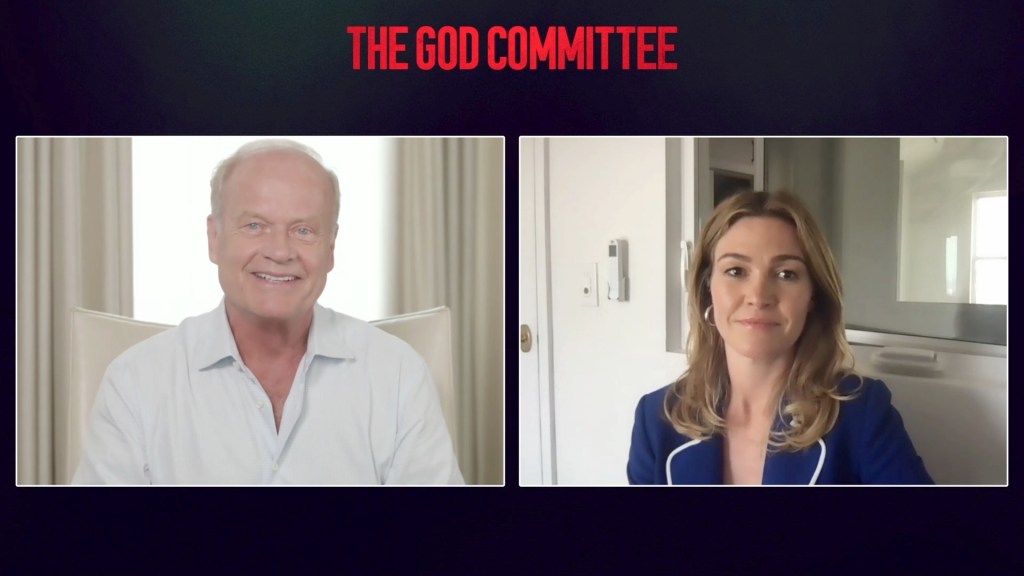Hospital drama The God Committee releases today in select theaters and on demand. It stars Kelsey Grammer, Julia Stiles, Janeane Garofalo, and Colman Domingo as members of a hospital committee that have to make the tough decision as to which patient will receive an organ transplant.
RELATED: Austin Stark & Colman Domingo Discuss The God Committee
“When a donor heart unexpectedly arrives at a New York hospital, an organ transplant committee must convene within one hour to decide which of three other patients deserves the life-saving heart,” says the official synopsis. “God’s work is now left in the hands of five doctors, including Boxer (Kelsey Grammer), a cynical but brilliant heart surgeon; Jordan (Julia Stiles), an idealistic up-and-comer; and Gilroy (Janeane Garofalo), a weary bureaucrat. As the debate over the heart heats up, ethics and bribes clash, leaving the committee members to question what’s more valuable: morals or money?”
ComingSoon Editor-in-Chief spoke with The God Committee stars Kelsey Grammer and Julia Stiles about their roles, how Grammer is able to portray such different characters throughout his career, and more. Check out the video interview below or read the full transcript.
Tyler Treese: Kelsey, this film does a great job of exploring the gray areas. As the name suggests, these very flawed individuals are playing God to some degree in deciding who lives or dies via these transplants and your performance really highlights the weight of the situation. What about your character were you able to really relate to?
Kelsey Grammer: It’s interesting. At first, it was hard for me to relate to him because he’s made so many choices that go away from humanity. You know, he distances himself from the human experience quite a bit as a character. That was fascinating to me, challenging to me because, I’m a big softie and this guy was pretty tough, but I was drawn to the subject matter. I was drawn to the phrase, certainly God committee, because obviously it was coined decades ago, but the idea that these people put themselves in that position and actually administer it with a great sense of responsibility and I guess the nuances of that challenge changes their personalities. His specific story, this character, the reason I wanted to play him was he’s facing a lot of things. Sort of a disadvantaged childhood in terms of just being a human being and the decisions he’s made in his life that have taken life away from him in a weird way. That’s a fascinating movie and tragic. I cry whenever I see it.
Julia, your character gets real trial by fire on our first day in the committee and she’s thrown into a really complex situation. Can you discuss Jordan’s situation? She’s a bit naive at first, but she quickly figures out how to operate.
Julia Stiles: Yeah. She shows up at the hospital and is pitching herself for the position and they hire her on the spot because there’s an opening. She’s now on this committee and a heart comes into the hospital. Organ donor. They have three or something patients that are candidates. The heart is still beating. They have something like three hours before they have to operate or the organ is going to fail. So yes, her first day is an exciting one. You get the sense that she’s very idealistic and she is emotionally invested in her patients and thinks of them as full human beings. [She] disagrees with Kelsey’s character about how to assess the patient. So he wants to be very statistical and scientific and mathematic about it. Then we see her later in life when she’s the head of the committee and she’s kind of spaced out and probably disillusioned with the system or has been beaten down by the system a little, but she’s hardened.
Kelsey, you’ve played such a wide range of roles from comedy to drama, but this really sticks out as a unique role for you and your range is just really incredible. Do you approach each role the same way or does it really vary depending on what’s needed from the character?
Kelsey: I pick roles based upon the fact that I haven’t done it before. That’s pretty much what it is in terms of how I approach them in. In performing them, I just try to uncover and be honest. Once in a while, like, let’s say if I’m was a gunfighter, I mean I’d learned to do gun tricks. But, you’re a doctor you’ll make sure you understand how to behave in an operating room, that kind of thing, but you don’t necessarily go and operate on people and nobody’s going to let you anyway. But that’s a good thing. It is to be as honestly in the moment of that character while you play it in that set of circumstances and to just discover what the truth is in that moment. You spend 30 years doing it, you kind of just eventually you just have to decide that you’re not doing anything, and let the story tell itself through you. That’s kind of the way I approach it. Maybe that’s a little esoteric, maybe it’s flimsy. I’m sorry, but that’s the best I can do.










